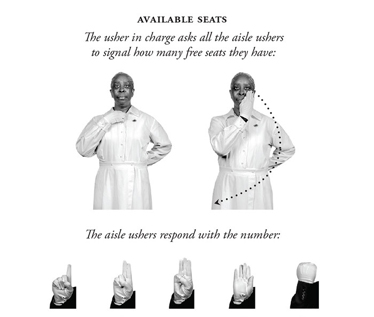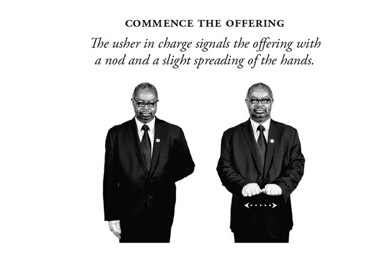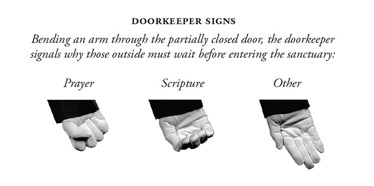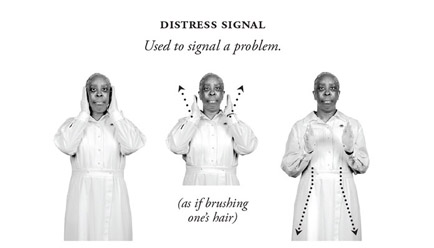Have you heard this quoted: “The church is not a museum for saints – it’s a hospital for sinners.”
It was popular when I was first saved; or, at least, that is when I first heard it from the pulpit.
It’s been attributed to Augustine, but that seems highly unlikely. In the fifth century AD, hospitals weren’t exactly places you’d go to get better.
The true source of the quote seems to be Abigail Van Buren – better known as advice columnist “Dear Abby.” It was published in newspapers on March 29, 1964, in response to a question from two people with troubled consciences because they were living together in sin.
Dear Abby told them to go to church because it was the place where sinners would be welcomed, not to continue in their sin, but to find healing through salvation – “a hospital for sinners.”
It is a modern metaphor to suggest how we ought to behave as believers towards those needing spiritual help.
As modern metaphors go, it’s better than some of the more recent ones. A professor at a Christian college wrote,
I asked several… pastors to try creating their own metaphors for what church ought to be. Their suggestions varied from a spiritual Starbucks, Alcoholics Anonymous.. and a continuation high school, to a Cheers-like bar where everybody knows your name and they’re always glad you came.
Recently in Texas the church service became a sports bar of sorts. The Friendship-West Baptist Church projected the Cowboy’s 27–17 win over the Ravens for its congregation, prompting one reporter to comment, “it left nearly the entire place thinking about Ezekiel Elliott instead of Ezekiel 3:10.”
James suggests a metaphor in chapter two. A set of related words jump out at you as you read verses one through thirteen: “judges” (v4), “courts” (v6), “guilty” (v10), “judged” (v12), and “judgement” (v13).
The word “law” is used throughout these verses as well.
James was comparing the meetings of the believers to a court proceeding – but not in a good way. He was pointing out that the way they were treating visitors was the way that corrupt judges treated people in their earthly courtrooms – preferring the wealthy while oppressing the poor.
The believers were doing it by looking on the outward appearance, and thereby showing partiality to those who had the trappings of wealth and social status.
We may not be doing that; at least, not obviously. But we all have a natural tendency to form judgments based on outward appearances – and James says that makes us “judges with evil thoughts,” and “transgressors of the law.”
These verses serve as a reminder that our gatherings should be places where “mercy triumphs over judgment,” which begins with each of us looking beneath the surface with the aid of the Holy Spirit and what James calls the “royal law of love.”
I’ll organize my thoughts around two points: #1 You Can Quit Looking At People Like A Judge Does, and #2 You Can Keep Loving People Like Jesus Does.
#1 – You Can Quit Looking At People Like A Judge Does (v1-7)
One of the commentators I read titled this section, “The Case of the Short-sighted Usher.”
It’s not easy ushering, and I give props to our guys.
In my research I came across a set of uniform hand-signals taught by the National United Church Ushers Association of America.
Who knew?
Please indulge me while I do some usher training.




There may not have been ushers in the gatherings James was describing; at least, not the way we think of ushers today.
The entire congregation was being short-sighted. They were prone to showing partiality.
Jas 2:1 My brethren, do not hold the faith of our Lord Jesus Christ, the Lord of glory, with partiality.
James was writing to the first generation of believers. They were mostly Jews who had become born-again. They were being scattered throughout the world on account of persecution.
How do you “hold the faith?” We might say of someone, “he holds to his convictions.” That is the idea here.
Except that these believers were “holding to their faith” in a way that was unbecoming. They were showing “partiality,” which James will illustrate in a moment.
Before he does, he gives them one word, describing Jesus, that, by itself, could solve their problem. It’s the word “glory,” when James calls Jesus “the Lord of glory.”
As we will see, they were being affected by the temporary “glory” displayed by the wealthy. Flashy clothing and gold rings on every finger.
(By the way, the word for “gold rings” is, literally, goldfingered).
If you are going to be attracted to glory, keep your eyes on Jesus, Who not only sits in glory, but is returning in glory.
Plus, He is changing you and I from glory-to-glory.
Plus He is one day going to complete His work in us, and we each will be glorified.
So there’s no reason to get distracted by the fading, false glory of this world. If you want glory, it’s glory galore with Jesus.
Let’s see exactly what James means by “partiality.”
Jas 2:2 For if there should come into your assembly a man with gold rings, in fine apparel, and there should also come in a poor man in filthy clothes,
Jas 2:3 and you pay attention to the one wearing the fine clothes and say to him, “You sit here in a good place,” and say to the poor man, “You stand there,” or, “Sit here at my footstool,”
Two men arrive simultaneously, needing to be seated.
The poor man isn’t turned away. He isn’t described as being mistreated. It was not uncommon in the first-century assemblies to “stand,” or to be seated on the floor.
Their problem was with how they reacted, in comparison, to the man of wealth and status. If there was only one good seat left, they’d give it to him, based on his outward appearance.
Jas 2:4 have you not shown partiality among yourselves, and become judges with evil thoughts?
Out in the world, this kind of partiality is practiced, and it is expected.
I often use the example of the private club at Disneyland, Club 33. One Christmas, Pam and I had ticketed reservations to see the annual Candlelight Processional. As we were waiting in line, some rude guy started shouting to a Cast Member, telling him (and everyone else) that he was a member of Club 33. He was immediately whisked away to special reserved seating.
I can understand that – in the world. But not in the church.
James introduces his metaphor, saying they had become “judges with evil thoughts.” He wasn’t calling them judgmental. He was comparing them to unjust, worldly, corrupt, bribe-loving judges.
Jas 2:5 Listen, my beloved brethren: Has God not chosen the poor of this world to be rich in faith and heirs of the kingdom which He promised to those who love Him?
He calls them “my beloved brethren.” James has a reputation for being in-your-face with his stinging rebukes. It’s not a fair assessment. He loves them too much to overlook attitudes and actions that will tear them down, rather than build them up.
God hasn’t only chosen “the poor of this world.” Jesus is the Savior of all men – especially those who believe. It’s just that the wealthy, and those with status, seem uninterested in the Gospel – trusting instead in this world and its fleeting riches.
True riches should always be measured by a spiritual standard. A believer is “rich in faith,” meaning he or she has access now to all spiritual blessings in heavenly places.
Believers are “heirs” of the coming Kingdom – which includes the Thousand Year Kingdom on the earth, and eternity.
“Those who love” Jesus – that’s another way of describing anyone who is born-again. It’s a title; like Christian, or believer. My dad used to call us “born-agains.”
Since Jesus “promised” us this wealth, it is secure for us, now and in Heaven. We should therefore be living on earth influenced by eternity. Displays of temporary glory shouldn’t attract us.
Jas 2:6 But you have dishonored the poor man. Do not the rich oppress you and drag you into the courts?
They “dishonored the poor man,” not by mistreating him, but by preferring the rich man.
James doesn’t say they should have ushered the poor man to the best seat, and mistreated the rich man. That would still be showing partiality. They must treat all as equals.
In Galatians 3:28 we read,
Gal 3:28 There is neither Jew nor Greek, there is neither slave nor free, there is neither male nor female; for you are all one in Christ Jesus.
Let me qualify this verse. It does not mean there are no distinctions whatsoever. Men and women, for example, are distinguished in the New Testament, and each have certain roles and responsibilities in the home and in the church.
What this verse is saying is that we are all rendered “one” as believers in Jesus Christ. It means God shows no partiality to men over women, or to women over men.
Or to Jews over Gentiles, or to Gentiles over Jews.
Or to slaves and masters.
James pointed out to them that the rich, as a class of people, were the ones leading the persecution against them.
Jas 2:7 Do they not blaspheme that noble name by which you are called?
I wonder what “that noble name” was? If we say, “Christian,” that’s probably inaccurate. James was writing only ten or fifteen years after the Day of Pentecost. In the Book of Acts, we read that the “disciples were first called Christians” much later, in the Gentile church of Antioch (11:26).
In Acts 9:2 we see Saul (Paul) seeking and receiving the authority to persecute Messianic Jews, who are referred to as “the Way.”
Whether that was the name or not, James refers to them as “noble.” It’s a short-hand for “rich in faith and heirs of the kingdom of God.”
I ran across this personal application of our text:
Let us test ourselves then on this important subject of partiality. Do we show more kindness to those of our own race than those of other races? Are we more kindly disposed to the young than to the old? Are we more outgoing to good-looking people than to those who are plain or homely? Are we more anxious to befriend prominent people than those who are comparatively unknown? Do we avoid people with physical infirmities and seek the companionship of the strong and healthy?
Do we favor the rich over the poor? Do we give the “cold shoulder” to “foreigners,” those who speak our language with a foreign accent?
As we answer these questions, let us remember that the way we treat the least lovable believer is the way we treat the Savior (Matthew 25:40).
Our assemblies should never be comparable to courtrooms where corrupt judges sit in judgment.
How do we overcome our natural tendencies to sit in judgment?
#2 – You Can Keep Loving People Like Jesus Does (v8-13)
The headline read, Judge Joe Brown Released On His Own Recognizance.
Excerpts:
Judge Joe Brown was released on his own recognizance Monday after he was charged with contempt of court and sentenced to five days in jail. Brown, 66, was sentenced for reportedly being disorderly in front of a magistrate Monday in juvenile court. He was representing a woman who was accused of being the mother of an unknown child by someone in Virginia.
You’ve seen enough lawyer shows to know what Own Recognizance means. When a person is granted release on their “own recognizance,” or “O.R.,” no bail money is paid to the court and no bond is posted. The suspect is merely released after promising, in writing, to appear in court for all upcoming proceedings.
James just suggested that his beloved brethren were acting like judges. You might say they were in contempt of Heaven’s law.
In these next verses, they are like judges released on their own spiritual recognizance, to judge themselves instead of others.
Jas 2:8 If you really fulfill the royal law according to the Scripture, “YOU SHALL LOVE YOUR NEIGHBOR AS YOURSELF,” you do well;
The metaphor of judges and judging suggested to James he talk more about God’s Law.
Jews were all about the Law of Moses, and trying to keep it. In their analysis, they had identified a total of 613 commandments. These included 248 positive commandments, to perform an act, and 365 negative commandments, to abstain from certain acts.
They were always seeking the greatest commandment – one that, if kept, overruled them all. It was a matter of constant debate among the rabbis.
It was therefore only a matter of time before they asked Jesus. The exchange is recorded in Matthew’s Gospel.
Mat 22:35 Then one of them, a lawyer, asked Him a question, testing Him, and saying,
Mat 22:36 “Teacher, which is the great commandment in the law?”
Mat 22:37 Jesus said to him, ‘YOU SHALL LOVE THE LORD YOUR GOD WITH ALL YOUR HEART, WITH ALL YOUR SOUL, AND WITH ALL YOUR MIND.’
Mat 22:38 This is the first and great commandment.
Mat 22:39 And the second is like it: ‘YOU SHALL LOVE YOUR NEIGHBOR AS YOURSELF.’
Mat 22:40 On these two commandments hang all the Law and the Prophets.”
Why doesn’t James mention loving the Lord with all their heart, soul, and mind?
He did – back in verse five, when he referred to them as “those who love the Lord.” His focus here is on loving your neighbor as yourself.
It’s the “royal law” because it is the supreme summary of the entire Old Testament, given directly by the King to His subjects.
Love your neighbor as yourself and, by default, you keep every other possible law.
If you love your neighbor as yourself, you will honor your parents… You will not murder, commit adultery, or steal from your neighbor… You will not bear false witness against your neighbor… And you will not covet anything of your neighbor’s.
If you’re wondering who, exactly, is your “neighbor,” it’s effectively everyone – not just folks you know or like or who are good to you.
Jas 2:9 but if you show partiality, you commit sin, and are convicted by the law as transgressors.
To show partiality is a violation of the royal law. It is both “sin,” and “transgression.”
Sin is any lack of conformity to the will of God, a failure to meet His standards.
Transgression is the breaking of a known law.
Certain acts are sinful because they are basically and inherently wrong, but they become transgressions when there is a specific law which forbids them
If there had been a debriefing after services the day the ushers showed partiality, this is what James would have said. They were in sin.
Jas 2:10 For whoever shall keep the whole law, and yet stumble in one point, he is guilty of all.
Remember, James was writing to saved Jews. They were used to certain laws being more heavily weighted than others.
I had a similar experience growing-up Roman Catholic. There were certain “mortal sins” which were far more serious than others, which were called “venial sins.”
This way of thinking about sin results in a person overlooking the severity of sin and transgression. It weights sins, so that if I don’t commit any of the ‘big ones,’ I feel OK about myself. It fosters an environment within which so-called lesser sins take hold.
James uses their own law to show that isn’t the right approach for a believer to take. Any “stumble” leaves you guilty of the whole law.
Jas 2:11 For He who said, “DO NOT COMMIT ADULTERY,” also said, “DO NOT MURDER.” Now if you do not commit adultery, but you do murder, you have become a transgressor of the law.
Al Capone. Notorious Chicago mobster. Architect of the St. Valentine’s Day Massacre. They could never get any charges against him to stick… Until they got him on tax evasion in 1931.
It wasn’t murder, or racketeering… But it was enough to get him incarcerated as a law breaker.
Why did James choose “murder” and “adultery?” Not sure – except I’m guessing that his beloved brethren, along with us, would rank them as much, much worse than showing partiality.
Not so, in one sense. Partiality is a serious violation of the royal law, too.
It portrays God as being partial – which is not true, and it misrepresents Him to the lost.
Jas 2:12 So speak and so do as those who will be judged by the law of liberty.
We said, in our last study (in chapter one) that “the law of liberty” means Jesus perfectly kept, and fulfilled, God’s Law while on the earth. As a result, when we are saved, we are no longer subject to the penalties of the Law, and, more importantly, we are endured with power in the Person of the indwelling Holy Spirit, to walk as new creatures.
We are at liberty, or free, to walk according to God’s will for our lives.
We are given a new nature – a divine nature – that defaults to keeping the royal law as long as we yield to the Holy Spirit.
We find, however, still within us what is called “the flesh” – a propensity to satisfy our appetites in excessive, evil, sinful ways.
Thus we can show partiality… Or we can show impartiality. The choice, really, is ours.
We’re on our own recognizance and should judge ourselves rather than become judges of others.
Jas 2:13 For judgment is without mercy to the one who has shown no mercy. Mercy triumphs over judgment.
William MacDonald writes:
Verse thirteen must be understood in the light of the context. James is speaking to believers. There is no question of eternal punishment here; that penalty was paid once for all at Calvary’s cross. Here it is a question of God’s dealing with us in this world as [His] children. If we do not show mercy to others, we are not walking in fellowship with God and can expect to suffer the consequences of a backslidden condition.
The “consequences of a backslidden condition” are God’s discipline.
In other words, like any good Father, God would rather show us mercy than have to discipline us. To quote MacDonald again, “The general idea seems to be that if we show mercy to others, the [discipline] which might otherwise fall on us will be replaced by mercy.”
How is justice portrayed, outside a courtroom? As blindfolded. A blindfolded judge cannot show partiality on the basis of wealth or status or ethnicity.
In our case, if we are blindfolded by the royal law, we will be free from judgment towards others and ready, instead, to show them God’s mercy.
Mercy has been defined as “not getting what you deserve” from God – which is death and Hell, since all fall short of His glory.
Like any metaphor we suggest, the hospital breaks down somewhat. No one wants to live in the hospital permanently; you want to be released.
But I think if we understand that, from time-to-time, we all need healing from some acute spiritual condition; or that there is still some chronic spiritual condition that we are dealing with as out-patients; then the hospital works somewhat as an extra-biblical metaphor.
Our assemblies ought to be mercy hospitals to those needing hope and wholeness – believer and nonbeliever alike.
